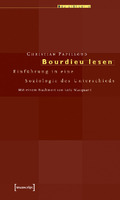Bourdieu lesen
Einführung in eine Soziologie des Unterschieds. Mit einem Nachwort von Loïc Wacquant
Abstract
Pierre Bourdieu (1930-2002) war einer der produktivsten zeitgenössischen Denker der Soziologie. Seine internationale Anerkennung beschränkt sich jedoch nicht allein auf den Bereich der Wissenschaft: Als weltweit engagierter Intellektueller hat Bourdieu - wie wohl kein anderer - soziologische Erkenntnis als politische Aufklärung der Alltagspraxis wirksam gemacht. Zentrale Begriffe der Soziologie Bourdieus wie etwa »Habitus«, »Kapital« oder »Feld« werden heute in einer Vielzahl von sozial- und kulturwissenschaftlichen Untersuchungen verwendet. Was aber hält diese Begriffe zusammen? Welche immanente Logik führt zu ihren Bedeutungen? Und wie werden diese miteinander verknüpft? Kurz: Worin liegen die erkenntnistheoretischen Voraussetzungen von Bourdieus Werk? Die vorliegende »Einführung in eine Soziologie des Unterschieds« versteht sich als Versuch, Bourdieu unter dieser Fragestellung zu lesen. Sie sieht im Begriff des »Unterschieds« das Grundprinzip seiner Erkenntnistheorie, in der »Unterschied« als Machtbeziehung konzipiert wird.
Keywords
Pierre Bourdieu; Soziologische Theorie; Gesellschaft; Sozialität; Soziale Ungleichheit; Kultursoziologie; Soziologie; Einführung; Sociological Theory; Society; Social Relations; Social Inequality; Sociology of Culture; Sociology; IntroductionDOI
10.14361/9783839401026ISBN
9783899421026Publisher
transcript VerlagPublisher website
https://www.transcript-verlag.de/Publication date and place
Bielefeld, 2003Series
Sozialtheorie,Classification
Cultural studies
Social mobility
Social theory


 Download
Download Web Shop
Web Shop